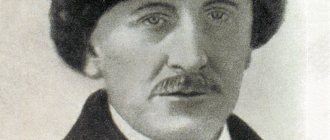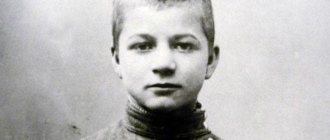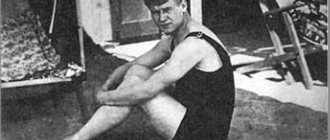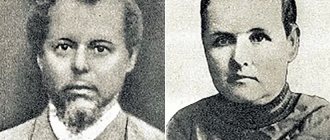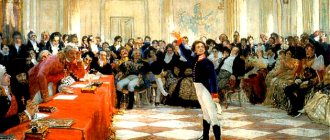May 9, 1872 – October 6, 1952 (80 years old)
4.5
Average rating: 4.5
Total ratings received: 214.
Teffi (1872–1952) - Russian writer, poet, translator. Under this sonorous pseudonym hid the noblewoman Nadezhda Aleksandrovna Lokhvitskaya - a woman with an incredible sense of humor and a subtle mind. She was called the “queen of laughter”, and Russian Emperor Nicholas II read her works. Teffi, whose biography is full of interesting facts, left a big mark on the culture of the twentieth century. Information about life and creativity will help you better prepare for a literature lesson in 8th grade.
Teffi's childhood
Relatives and friends learned that there had been an addition to the Lokhvitsky family living in St. Petersburg in 1872 - that’s when, in fact, this happy event happened. However, there is now a problem with the exact date - it is impossible to reliably name it. According to various sources, this could be either April or May. Be that as it may, in the spring of 1872, Alexander and Varvara Lokhvitsky had a baby - the girl was named Nadenka. This was not the couple’s first child - after the eldest son Nikolai (he would later become Kolchak’s closest ally) and middle daughters Varvara and Maria (Masha would later prefer to be called Mirra - under this name she would become famous as a poetess).
Not much is known about Nadyusha’s childhood. Although you can still glean something - for example, from her own stories, where the main character is a girl - well, so funny, the spitting image of Nadya in childhood. Autobiographical features are undoubtedly present in many of the writer’s works. Posrelenok is the name given to children like little Nadenka.
Nadya's father was a famous lawyer, the author of many scientific works, a professor and publisher of his own magazine. Her mother's maiden name was Goyer; she belonged to a family of Russified Frenchmen and was well versed in literature. In general, everyone in the Lokhvitsky family loved to read, and Nadya was by no means an exception. For many years, the girl’s favorite writer remained Leo Tolstoy, and Teffi’s very bright story is widely known - the memory of the already adult Nadezhda - about how she went to the estate to visit the great writer.
Young years. Sister
Nadenka was always friendly with her sister Maria (later known as Mirra Lokhvitskaya, poetess). There was a three-year difference between them (Masha is older), but this did not prevent the two sisters from having a good relationship. That is why, in their youth, both girls, who loved literature, had a penchant for writing and dreamed of taking their place on the literary Olympus, agreed: there should be no competition between them, this is one, but two - for this purpose, you need to start your creative path not at the same time, but one by one. And the first place is the Machine, it’s fairer, because she’s older. Looking ahead, it must be said that the sisters’ plan, in general, was a success, but not quite in the way they imagined...
Marriage
According to the sisters’ original plan, Masha was to be the first to step onto the literary podium, bask in the rays of glory, and then give way to Nadya, ending her career. However, they did not imagine that the poems of the aspiring poetess Mirra Lokhvitskaya (Masha decided that the name Mirra was more suitable for a creative person) would resonate so much in the hearts of readers. Maria gained instant and stunning popularity. The first collection of her poems spread at the speed of light, and she herself was undoubtedly one of the most widely read authors at the end of the nineteenth century.
What about Nadya? With such success of her sister, there could be no talk of ending her career. But if Nadya tried to “break through”, it is very likely that the shadow of her popular older sister would close her down. Nadezhda understood this perfectly, and therefore was in no hurry to declare herself. But she hurried to get married: barely graduating from a women's gymnasium, in 1890 she married a Pole, Wladislav Buchinsky, a lawyer by profession. He worked as a judge, but after marrying Nadya, he left the service, and the family went to his estate near Mogilev (now Belarus). Nadya was only eighteen years old at that time.
However, it cannot be said that the couple’s family life was successful and happy. What was this marriage - love or calculation, a cold decision to arrange a family life while the sister arranges her own - literary, in order to later be able to devote herself entirely to her career?.. There is no answer to this question. Be that as it may, by the time Nadezhda Lokhvitskaya’s family already had three children (daughters Valeria and Elena and son Janek), her marriage to Vladislav was bursting at the seams. By the beginning of the new millennium, the couple separated. In 1900, twenty-eight-year-old Nadezhda reappeared in St. Petersburg with the firm intention of settling in literary circles.
Personal life
imprint of mystery on the fate of Nadezhda Alexandrovna . Her great-grandfather on her father's side, a Pole named Konrad Lochvitsky , was a poet, his poems were distinguished by mysticism and gloom. According to family legend, the poet's talent was passed down through the male line. A woman who risked taking this path had to pay with her own happiness.
Mirra died young, she had a heart condition. Teffi had no personal happiness either.
Having married at an early age, she soon separated from her husband. Three children: Valeria , Elena and Janek remained with their father. Vladislav Buchinsky forbade Teffi to meet with them.
With the first child
Nadezhda Lokhvitskaya was an unusually beautiful woman with a mysterious, self-absorbed look. She showed attention, endless kindness and care to her friends, but to strangers who wanted to know more about her, she turned a completely different side, showing irritability or melancholy. She did not like to talk about personal things and often laughed them off in her characteristic witty manner.
Many called her a demonic woman after the title of the story, a satirist in a skirt, the queen of humor.
Combining satire and humor in her works, ridiculing human shortcomings and weaknesses, she managed to write without anger, imbued with the character of ordinary people, their concerns and aspirations. Her stories are imbued with lyricism and marked by subtle insight. This speaks of great powers of observation and developed intelligence . Her favorite genre was miniatures.
There are several explanations why - Teffi . It used to be customary for women writers to sign their works with male pseudonyms. Nadezhda Alexandrovna did not condescend to the generally accepted. She decided to come up with something stupid, as she herself explained. In her parents' house there lived a narrow-minded servant named Stepan, who was nicknamed Steffy . Nadezhda removed the first letter, and took what was left as a pseudonym, explaining that it was a surname. She writes about this in her story “Pseudonym”.
The second version is borrowed from R. Kipling’s fairy tale “How the First Letter Was Written ,” where a very lively and naughty girl had this name.
After parting with Buchinsky, Nadezhda Aleksandrovna completely devoted herself to literary activity. And only during the years of emigration, in Paris, she met her second love - Pavel Theakston , with whom she lived in harmony for many years. Theakston suffered a stroke after losing his fortune. After his death, Teffi was left alone again. She saw her children – Valeria, Elena and Janek – extremely rarely .
Russian emigrants gathered in the literary salon opened by Nadezhda Alexandrovna in Paris. Alexey Tolstoy, Ivan Bunin, Zinaida Gippius, Konstantin Balmont, Alexander Kuprin, Dmitry Merezhkovsky, Khodasevich, Don Aminado were there.
The losses she experienced, hunger, emigration, and fascist occupation could not but affect her work. There was less and less mockery and satire in her stories, more and more sadness and philosophical reasoning.
At the end of the war she did not write for a long time . Nothing was heard from her. It was believed that Nadezhda Teffi had died. An obituary was written, which greatly amused her.
After the Great Patriotic War, she was invited several times to return to the USSR, but she did not go. She explained this by saying that there was great fear ingrained in her memory.
Valeria , the eldest daughter of the writer, lived in London after the war. The second daughter, Elena , a dramatic actress, remained to live in Warsaw. Little is known about the fate of her son Janek
In 1951, a collection of autobiographical stories by Teffi . In the last years before her death, Teffi wrote memoirs. The famous philanthropist Solomon Atran paid her a small lifetime pension.
Even in her old age, Teffi remained a beautiful woman ; she always carefully looked after herself. In one of her last works, she talks about asking the Lord to send his best angels for her at her death hour. Her funeral service was held in the Alexander Nevsky Cathedral in Paris.
Tomb of Nadezhda Teffi
First publications
The first thing Nadezhda published under her own name (she returned it back after breaking up with Vladislav), small poems, caused a wave of critical comments, on the one hand, and went unnoticed by readers, on the other. Perhaps these poems were attributed to Mirra, who published under the same name, but in any case they did not create a sensation. As for criticism, for example, Nadezhda’s future colleague Valery Bryusov extremely scolded them, believing that they contained too much tinsel, empty, fake. However, the poems were only the first experience of the writer; she became famous not thanks to poetry, but thanks to prose: Teffi’s stories brought her well-deserved fame.
The appearance of a pseudonym
After her first experience with poems, Nadya realized: for St. Petersburg alone, two Lokhvitsky writers are too many. A different name was needed. After a diligent search, it was found: Teffi. But why Teffi? Where did Nadezhda Lokhvitskaya's pseudonym come from?
There are many versions on this matter. The most common one says that Lokhvitskaya borrowed this name from Kipling (he has such a girlish character). Others believe that it is from Edith Nesbit, only slightly modified (she has a heroine named Effie). Nadezhda Aleksandrovna Lokhvitskaya herself, in her own story “Pseudonym,” told the following story: she wanted to find a pseudonym that was neither male nor female, but something in between. It occurred to me to borrow the name of some “fool,” because fools are always happy. The only fool I knew was the parents' servant Stepan, who was called Steffy in the house. This is how the name arose, thanks to which Nadezhda managed to gain a foothold on literary Olympus. How true this version is cannot be said with certainty: the writer, whose path was humorous and satirical stories, loved to joke and confuse those around her, so she took the true secret of her pseudonym Teffi with her to the grave.
View from the other side
The versatile and bright talent of Nadezhda Aleksandrovna Teffi is viewed with great interest by everyone who cares about the turning point in Russian history in which she happened to live and work. This writer can hardly be considered a literary star of the first magnitude, but the image of the era without her will be incomplete. What is especially interesting for us is the view of Russian culture and history from those who found themselves on the other side of its historical divide. And outside Russia, to use a figurative expression, there was an entire spiritual continent of Russian society and Russian culture. Nadezhda Teffi, whose biography turned out to be split into two halves, helps us to better understand those Russian people who consciously did not accept the revolution and were its consistent opponents. They had good reasons for this.
Becoming
She was done with poetry for a while (but not forever - the writer returned to it in 1910, publishing a collection of poems, again, however, unsuccessful). The first satirical experiments, which suggested to Nadezhda that she was moving in the right direction and subsequently gave life to Teffi’s stories, appeared in 1904. Then Lokhvitskaya began to collaborate with the newspaper Birzhevye Vedomosti, in which she published feuilletons castigating the vices of various representatives of the “top of power.” It was then that they first started talking about Teffi - these feuilletons were already signed under a pseudonym. And three years later, the writer published a small one-act play entitled “The Women’s Question” (some believe that Nadezhda’s pseudonym first appeared with this work), which was later even staged at the Maly Theater in St. Petersburg.
Fans of Teffi's comics and stories, despite the fact that they often ridiculed the authorities, were also among these same authorities. At first Nicholas II laughed at them, then they delighted Lenin and Lunacharsky. In those years, Teffi could be read in many places: she collaborated with various representatives of the periodical press. Teffi’s works were published in the magazine “Satyricon”, in the newspaper “Birzhevye Vedomosti” (which was already mentioned earlier), in the magazine “New Satyricon”, in the newspaper “New Life”, which was published by the Bolsheviks, and so on. But Teffi’s true glory was yet to come...
Poems and humorous stories
The first thing that comes to mind when getting acquainted with the creative heritage of the poetess is the famous saying of Anton Pavlovich Chekhov - “Brevity is the sister of talent.” Teffi's early works correspond to him fully. The poems and feuilletons of the regular author of the popular magazine “Satyricon” were always unexpected, bright and talented. The public was constantly expecting a continuation, and the writer did not disappoint the people. It is very difficult to find another such writer, whose readers and admirers were such different people as the Sovereign Emperor Autocrat Nicholas II and the leader of the world proletariat Vladimir Ilyich Lenin. It is quite possible that Nadezhda Teffi would have remained in the memory of posterity as the author of light, humorous reading, if not for the whirlwind of revolutionary events that covered the country.
Woke up famous
This is exactly what they say when an event occurs that overnight makes a person a “star,” a mega-popular and recognizable personality. A similar thing happened with Teffi - after the publication of her first collection of humorous stories with the same name. The second collection, released soon after the first, not only repeated his success, but also surpassed it. Teffi, like her older sister once upon a time, has become one of the most beloved, read and successful authors in the country.
Until 1917, Nadezhda published nine more books - one or even two a year (the first collection of stories appeared in 1910 simultaneously with the previously mentioned collection of poems). Everyone brought her success. Teffi's stories were still in demand by the general public.
Emigration
The year 1917 came, the year of revolution, the year of a radical change in people's lives. Many writers who did not accept such drastic changes left the country. What about Teffi? And Teffi was delighted at first - and then horrified. The consequences of October left a heavy mark on her soul, which was reflected in the writer’s work. She writes new feuilletons, addressing them to Lenin’s comrades, she does not hide her pain for her native country. She publishes all this, at her own peril and risk (she really risked both her freedom and her life), in the magazine “New Satyricon”. But in the fall of 1918 it was closed, and then Teffi realized: it was time to leave.
First, Nadezhda moved to Kyiv, then, after some time, to Odessa, to several other cities - and finally reached Paris. She settled there. She did not initially intend to leave her homeland, and being forced to do this, she did not give up hope of a quick return. It didn’t happen - Teffi lived in Paris until the end of her life.
In emigration, Teffi’s creativity did not fade away; on the contrary, it blossomed with renewed vigor. Her books were published with enviable regularity both in Paris and in Berlin, she was recognized and talked about. In general, everything would be fine - but not at home... But “at home” they forgot about Teffi for many years - until the mid-sixties, when publication of the writer’s works was finally allowed again.
Bibliography
Publications prepared by Teffi
- Seven lights - St. Petersburg: Rosehip, 1910
- Humorous stories. Book 1. - St. Petersburg: Rosehip, 1910
- Humorous stories. Book 2 (Apes). - St. Petersburg: Rosehip, 1911
- And so it became. - St. Petersburg: New Satyricon, 1912
- Carousel. - St. Petersburg: New Satyricon, 1913
- Miniatures and monologues. T. 1. - St. Petersburg: ed. M. G. Kornfeld, 1913
- Eight miniatures. — Pg.: New Satyricon, 1913
- Smoke without fire. - St. Petersburg: New Satyricon, 1914
- Nothing like that, Pg.: New Satyricon, 1915
- Miniatures and monologues. T. 2. - Pg.: New Satyricon, 1915
- And so it became. 7th ed. - Pg.: New Satyricon, 1916
- Lifeless beast. - Pg.: New Satyricon, 1916
- Yesterday. — Pg.: New Satyricon, 1918
- Smoke without fire. 9th ed. — Pg.: New Satyricon, 1918
- Carousel. 4th ed. — Pg.: New Satyricon, 1918
- Black iris. — Stockholm, 1921
- Treasures of the earth. — Berlin, 1921
- Quiet backwater. — Paris, 1921
- This is how we lived. — Paris, 1921
- Lynx. — Paris, 1923
- Passiflora. — Berlin, 1923
- Shamran. Songs of the East. — Berlin, 1923
- Town. — Paris, 1927
- Book June. — Paris, 1931
- Adventure novel. — Paris, 1931
- Witch . — Paris, 1936
- About tenderness. — Paris, 1938
- Zigzag. — Paris, 1939
- All about love. — Paris, 1946
- Earthly rainbow. - New York, 1952
- Life and collar
- Mitenka
Pirate editions
- Instead of politics. Stories. - M.-L.: ZiF, 1926
- Yesterday. Humorous stories. - Kyiv: Cosmos, 1927
- Tango of death. - M.: ZiF, 1927
- Sweet memories. -M.-L.: ZiF, 1927
Collected works
- Collected works [in 7 vols.]. Comp. and preparation texts by D. D. Nikolaev and E. M. Trubilova. - M.: Lakom, 1998-2005.
- Collection Op.: In 5 volumes. - M.: TERRA Book Club, 2008
Other
- Ancient history / . — 1909
- Ancient history / General history, processed by Satyricon. - St. Petersburg: ed. M. G. Kornfeld, 1912
last years of life
At the end of her life, having survived the occupation during the Second World War, hunger, poverty, and separation from her children, Nadezhda Alexandrovna lost her humorous outlook on life a little. Teffi's stories, published in her last book (in 1951 in New York), are permeated with sadness, lyricism and are more autobiographical. In addition, during the final years of her life, the writer worked on her memoirs.
Teffi died in 1952. She is buried in the Sainte-Geneviève-des-Bois cemetery in Paris. Next to her is the grave of her colleague and fellow emigration Ivan Bunin. You can come to the Sainte-Genevieve-des-Bois cemetery at any time and honor the memory of Teffi and many other once-famous talented personalities.
Revolution
The beginning of these events, which changed Russia beyond recognition within a few years, can be observed in the stories and essays of the writer. The intention to leave the country did not arise overnight. At the end of 1918, Teffi, together with the writer Arkady Averchenko, even made a trip around the country, blazing in the fire of civil war. During the tour, performances in front of the public were planned. But the scale of the events that unfolded was clearly underestimated. The trip dragged on for about a year and a half, and every day it became more and more obvious that there was no turning back. The Russian land underfoot was rapidly shrinking. Ahead there was only the Black Sea and the path through Constantinople to Paris. This was done by Nadezhda Teffi together with the retreating units of the White Army. Her biography subsequently continued abroad.
